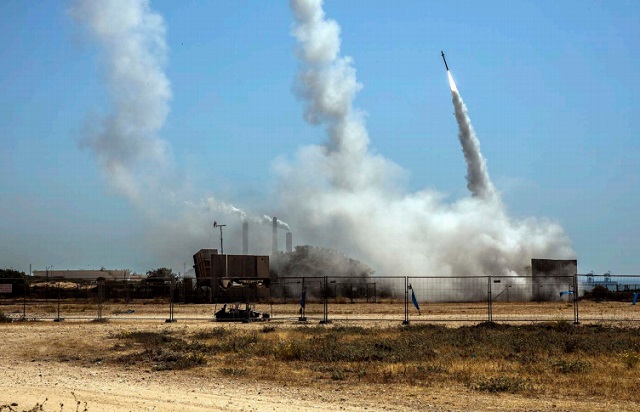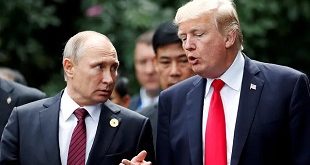
What sparked the latest attacks?
| THE INDEPENDENT | For weeks, tensions had been building between Israelis and Palestinians in Jerusalem, with a confluence of recent events and longer-term trends leading to the latest violence.
Israeli restrictions around holy sites during Ramadan; increasingly intense protests and violence on both the Israeli and Palestinian sides, with each side blaming the other for initiating; and a court decision, now under higher court review, to remove Palestinian families from an East Jerusalem neighborhood preceded this latest round of conflict — the most violent since the 2014 Gaza war.
More broadly though, sclerotic Israeli and Palestinian internal politics not only made this conflagration more likely, but also mean that finding a path to de-escalation will be more difficult.
As part of the immediate background of the current violence, on April 25, after days of protests and clashes, Israeli security services removed metal barriers around the Damascus Gate in Jerusalem — the main thoroughfare for Palestinians in East Jerusalem entering the Old City to pray at the Al-Aqsa Mosque during the month of Ramadan.
In the weeks that followed, Palestinians continued to protest Israeli police practices limiting access to the Old City’s holy sites, leading to a number of clashes with police.
Meanwhile, tensions have been rising in the Palestinian-majority Sheikh Jarrah neighborhood in East Jerusalem, as the Israeli government ordered a number of Palestinian families to leave their homes, after a court ruling that Jewish families held a historic claim to the property. Israeli law allows Jews to reclaim property lost in the 1948 war but prevents Palestinians (including Palestinian citizens of Israel) from recovering property lost in the same war. The highly controversial decision has led to days of solidarity protests by Palestinians in East Jerusalem and clashes with police and Israeli Jews in adjacent neighborhoods.
Both of these flashpoints came after weeks of smaller cross-communal clashes between Palestinians and Israeli Jews in and beyond Jerusalem — Palestinian youth attacks on Haredi (ultra-orthodox Jewish) light-rail passengers; an Israeli far-right march through Jerusalem with Jewish ultra-nationalists chanting “death to Arabs”; and drive-by shootings and stone-throwing attacks, among other incidents. Against this already tense backdrop, May 10 marked Jerusalem Day, commemorating the day Israel took control of the Old City and East Jerusalem during the 1967 war. Each year on this day, Israeli ultra-nationalists hold a “Flag March” through the city, often marked by harassment and provocations of Palestinian residents. As a result of the ongoing violence, this year’s marches were re-routed and cancelled. Nonetheless, Israeli ultra-nationalist and pro settlement-expansion politicians — led by Religious Zionist Party head Bezalel Smotrich — provocatively visited Sheikh Jarrah.
On Monday, May 10, Israeli police raided the Al-Aqsa compound, firing rubber bullets and stun grenades at Palestinians throwing rocks. The incursion on the mosque — the third holiest site in Islam — outraged many, and was reminiscent of the 2000 visit by Ariel Sharon, then a right-wing candidate for Knesset premier, to the Temple Mount which set off the second intifada.
Referencing the raid and ongoing Israeli police presence in Sheikh Jarrah, Hamas and Islamic Jihad, another Palestinian militant group, launched a massive barrage of rockets — including toward Jerusalem and Tel Aviv for the first time in many years — from Gaza, straining Israel’s Iron Dome defense system. Israel responded with an enormous bombardment of Gaza. Meanwhile, Palestinian citizens of Israel have poured into the streets in an uncommon mass show of civil unrest.
By May 14 more than 100 people – mainly Palestinians had been killed, including 27 children, and more than 580 wounded. Momentum toward further confrontation continued, as Israeli military forces advanced toward and surrounded Gaza.
Role of Israel, Palestinian politics
For most of the last two years, Israel has been unable to form a government, leading to a series of elections and constant maneuvering among Israel’s political operators — most notably acting Prime Minister Benjamin Netanyahu. Some analysts have begun to question whether events would have spiraled in the same way under a stable government. Daniel Seidemann, an expert on Jerusalem’s politics and demographics, said that the difference in this round of violence is the lack of a “responsible adult” to keep things from spiraling. This vacuum, combined with right-wing political and ideological one-upmanship — which has facilitated a coarser rhetoric and emboldened once-fringe actors — is salient context for the current crisis. As Israel seems likely to be approaching a fifth election later this year, the current confrontations seem certain to bring security and the Palestinian question back into the center of Israeli politics — but potentially in a more nationalistic and hawkish direction.
Palestinian politics are perhaps the most dynamic they’ve been in the past 15 years, albeit in directions concerning for many. In January, Palestinian Authority (PA) President Mahmoud Abbas announced that Palestinian Legislative Council elections would occur on May 22 and presidential elections on July 31, resulting in widespread popular enthusiasm. On April 29, however, Abbas announced that because the Israeli government would not allow the PA to place ballot boxes in East Jerusalem, the elections would be postponed. The announcement was widely considered an excuse to avoid elections, as Abbas’s beleaguered Fatah Party was expected to fare poorly against Hamas. As the current conflict continues, Hamas seems likely to see a surge in popularity among Palestinians angered by Israel, while Fatah and Abbas — committed to nonviolent resistance but in the eyes of many Palestinians missing in action from the Palestinian struggle — may see popularity erode further. This deterioration may crush any final hopes for near-term elections or West Bank-Gaza reconciliation; will give credence to Israeli skeptics of the peace process who claim Israel has no real partner for peace; and will continue to frustrate international actors supportive of an Israeli-Palestinian negotiated peace settlement.
U.S role and de-escalation
Clashes between Israel and Gaza’s militant factions often follow a similar pattern: escalation until the parties have reached an exhaustion point, at which time an international actor steps in to broker a cease-fire, buying time until the next escalation.
Under the Biden administration, the United States has been mostly quiet in addressing the Israeli-Palestinian conflict, in no small part because of disorder in the Israeli and Palestinian political scenes. The current crisis will raise pressure on the Biden administration to be more active in addressing the Israeli-Palestinian conflict — in the near-term likely not the core issues, but minimally the facts on the ground exacerbating tensions. The administration has condemned the rocket fire from Gaza and said it supports Israel’s right to defend itself, while also acknowledging that it has expressed its concerns to Israeli officials over the Sheik Jarrah evictions.
Pushing for de-escalation would require a reassertion of U.S. leadership and engagement with allies. International actors — the U.N., European states, Arab states and others – have historically played an important role in reducing violence between Israelis and Palestinians, and we can expect this to be the case again. The Biden administration — keen to strengthen transatlantic alliances and open to multilateral efforts — will find allies for doing so in European capitals and international organisations, with credibility and access in Gaza.
Longtime U.S. regional partners such as Jordan, Egypt, Saudi Arabia, Qatar, Morocco and the UAE all have a role to play in de-escalation and stabilisation. Egypt and Qatar have consistently played important roles in mediating cease-fires between Hamas and Israel. Jordan and Morocco — both states with treaties/agreements with Israel — hold religious credibility on issues related to Al-Aqsa. The UAE and Saudi Arabia — the former of which prizes its new relationship with Israel, the latter of which Israel desires relations with — could potentially play an influential role in pressuring parties to de-escalate. Whether the recent normalising states (UAE, Sudan, Bahrain and Morocco) wish to get involved remains to be seen.
In the longer-term, should it decide to address the Israeli-Palestinian conflict, the Biden administration will need to address the issues creating stress, and credibly pressure the parties to limit provocative actions. Toward Israel, this will mean expressing concern over incursions on Haram al-Sharif, home demolitions and expulsions, settlement expansion, and the like. Toward the Palestinians, the administration will need to determine its position on reconciliation, which would have to include Hamas, as well as issues of incitement and the controversial prisoner payment system. Doing so would undoubtedly require walking a domestic political tightrope, as many will defend Israel’s right to self-defense, or the rights of Palestinian civilians caught in the quagmire.
But it seems that — as has been the case many times before — the Israeli-Palestinian conflict will not settle into a frozen one, able to be cast aside by the international community. Rather, without active measures to address flashpoints and convince publics that peace with the other is possible, events could spiral out of control.
****
Source: United States Institute of Peace
 The Independent Uganda: You get the Truth we Pay the Price
The Independent Uganda: You get the Truth we Pay the Price



